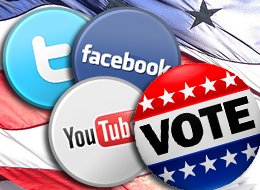The Politics of Social Networking

It is often claimed that in today’s media environment, people effectively cordon themselves off into the ideological equivalent of gated communities, sheltering themselves from alternative viewpoints and opinions that might differ from their own. However, a study of people’s habits on social networking sites by the Pew Internet and American Life Project finds that this piece of conventional wisdom, like so many others, does not appear to hold true in reality.
The survey of over 2,253 adults asked respondents how politics comes into play in their normal activity on a range of social networking sites, such as Facebook, Google+ and so on, but it also inquired about basic internet use as well. Overall, Pew found that 80% of adults in the United States use the internet and that 66% of those are active on any number of popular social networking platforms.
Interestingly, the popularity of social networking sites drops off as one moves from left to right on the one-dimensional political scale from liberal to conservative. 74% of self-described liberals use social networking sites, compared with 70% of moderates and 60% of conservatives.
According to the survey, a fairly large percentage of individuals who use social networking sites, 38%, have discovered through online interactions that their friends’ political viewpoints were different than they had imagined. This was the case for 49% of Democrats, 39% of Republicans and 32% of Independents. Those at the far end of the ideological spectrum were most likely to be surprised upon discovering their friends’ actual political viewpoints, as this was the case for 54% of those who described themselves as very liberal and 52% of those who identified as very conservative. Unfortunately, the survey apparently did not inquire as to whether the respondents were pleasantly or unpleasantly surprised. Only 33% of moderates had a false impression about the political viewpoints of those they interact with online.
Given the fact that social networking strategy has become a vital part of the campaign process for offices at virtually all levels of government, there is relatively little political discussion in the social media. 23% of respondents stated that “none” of the content their friends share on social networking sites is related to politics, 36% said there was “just a little,” and 30% said “some.”
That may well be the case because there is so little agreement even among friends in the social media. When asked whether they agree with the political content or opinions their friends post online, 64% of those queried in the survey said they agree “only sometimes” and 73% said they disagree “only sometimes.” When they see an item they disagree with, the most common response was to have no response at all. 66% said they ignore posts they disagree with, while 28% said they respond with a comment or posting of their own.
At the same time, political disagreements have led to a fair number of falling outs online: 18% of respondents stated that they had blocked, unfriended or hidden someone on a social networking site because of political differences. This appears to be most often the case with distant friends or acquaintances, but 31% reported that they had done so to a close personal friend and 18% said they had done it to a family member. Liberals, who were much more likely to share political content on social networking sites than moderates or conservatives, were also much more likely to block someone they disagreed with online.



